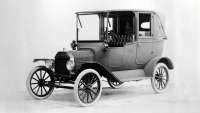Perfection is overrated. Look at the Mona Lisa; she doesn't even have eyebrows, or a waist, and yet she's fascinated us for centuries.
And so it goes with gearboxes. Ferrari's new 488 GTB has a seven-speed, dual-clutch "F1" transmission that is as close to flawless as anything modern science has achieved, but the fact that you can't even choose to buy this car with a manual gearbox is a crying shame.
Sure, it could be argued that no one driving a car that fast has time to change gears, that it's wiser to hang on with both hands, and that no manual could cope with its titanic 760Nm of torque.
Yet it could equally be argued that the sport of Formula 1 would be more interesting if they made them go back to shifting their own cogs, with a clutch. And that's because the possibility of mistakes makes things more interesting.
Not only that, it makes getting something as inherently tricky as changing gear in a manual - particularly if you're old school/nerdy enough to try and heel-and-toe your down changes - so much more satisfying when you do get it right.
The argument for manual super cars was lost long ago, of course, because they, like race cars, are all about the pursuit of pure speed, and flappy-paddle shifts are undeniably faster (it's also possible that owners complained about being unable to fit their left legs into their pant legs any more, with super-car clutches being so truck-like).
Even the purists at Porsche, which still offers one of the most beautifully bolt-action-like manual shifts in most of its proper sports cars, no longer gives you the option if you're buying something as track-focused as a 911 GT3.
Getting a manual shift just right is up there with hitting a good golf shot
In normal, mortal 911s - and Boxsters and Caymans - however, you can, and really should, choose the manual. Porsche's PDK transmission is quicker, slicker and far closer to perfect, but drive one back to back with an old school, left-leg-exercising version and you are simply experiencing more joy, more connection with the machine, more satisfaction at getting it right.
Yes, you'll be slower on a track, and by a gnat's whisker off the lights, but getting a manual shift just right (particularly in a Porsche) is up there with hitting a good golf shot. Effectively, a dual-clutch golf club would guarantee you hit the perfect shot every time, which would be satisfying at first, but boring after a while.
Buying a manual is going out of fashion, though, and fast. BMW makes a mighty fine old-school six-speeder, but its M3 was one of the first to start the paddle revolution (with the actually quite awful SMG transmission), and a frightening 95 per cent of customers for what is arguably its best car now tick the dual-clutch box (compared to 98.5 per cent of all BMWs sold locally).
Those of us in the five per cent can only weep at the foolishness of the majority. Do M3 (and M4) buyers really care so much about the convenience/laziness of the automatic option?
At the pocket-rocket end of the market, where being able to shift gears adds something to the driving experience that a lack of power and torque have taken away, there seems to be some hope, at least, with Peugeot's 208 GTI (and the brilliant 30th Anniversary Edition) offering only a manual gearbox.
Squaring the ledger, sadly, is the Renault Sport Clio, which is now dual-clutch only, and a lesser car for it.
A Golf GTI with a dual-clutch DSG box can snap its way between gears with no noticeable loss of momentum between shifts, just a slightly mystifying farting noise, while how quick your changes are in the manual will involve more skill. It's a safe bet that you'll be having more fun if you're using the VW's clutch, though, because this is yet another joyous little manual to use.
There are some cars where it could be argued that the automatic versions have no right to exist. The Toyota 86/Subaru BRZ twins would be near the top of that list, because they are, at least, 60 per cent less fun to drive without a proper clutch.
The Mini deserves a mention as well. Fun and frisky with a manual, it's a car that is basically anaesthetised by its automatic option.
At the very pointiest end of the manual vs auto debate, though, sits the new Mazda MX-5. Mazda Australia predicts that 60 per cent of the customers for this fabulous, fun new car will choose to go old school and opt for the manual.
The automatic is like buying a big bottle of expensive-looking scotch and then discovering that it's alcohol-free
While this still means almost half of all buyers will make the wrong choice, it's reassuring that buyers of a purists' machine like this realise that part of what makes it so involving and invigorating to drive is the feeling that you are really driving it. You are not removed from the machine, or the road, as you are in more expensive cars, you truly feel part of the process, and getting your shifts right, using the silky, light and easy clutch and shift action, is a big part of that.
The automatic, by comparison, is like buying a big bottle of expensive-looking scotch and then discovering that it's alcohol-free.
Manuals can be more affordable, and more economical, and those twin appeals, along with the more vital driver involvement, still seem to win plenty of fans in Europe, where they are still a popular choice (in the UK for example, 75 per cent of cars sold in 2013 were manual equipped), but sadly Australia is following the US example, where 93 per cent of all cars sold are automatic.
But then again, many of them probably think Mona Lisa is a movie.

.jpg)

.jpg)


.jpg)



.jpg)
.jpg)
.jpg)
.jpg)
.jpg)
.jpg)
.jpg)




.jpg)
.jpg)
.jpg)
.jpg)
.jpg)
.jpg)
.jpg)









.jpg)
.jpg)
.jpg)
.jpg)
.jpg)
.jpg)
.jpg)
.jpg)
.jpg)
.jpg)
.jpg)
.jpg)
.jpg)
.jpg)
.jpg)
.jpg)



.jpg)





.jpg)

